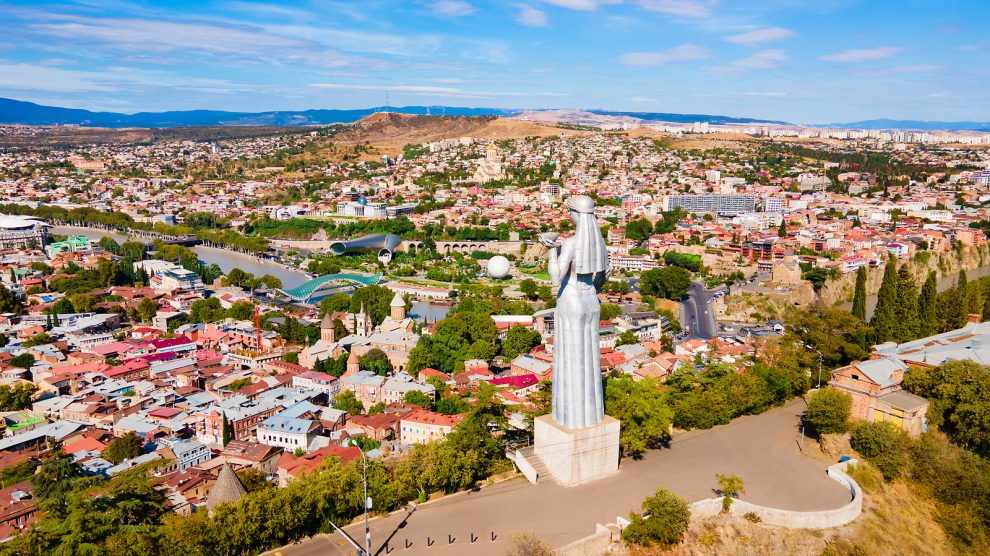During a weeklong trip to China, Georgia’s Prime Minister Irakli Garibashvili made a surprise announcement: Georgia and China will elevate their bilateral relations to a ‘strategic partnership’. The move comes as Georgia looks to increase Middle Corridor trade amid uncertainty over its future ties with the European Union.
When the Georgian prime minister, Irakli Garibashvili, arrived in China on July 26 for the 31st Chengdu FISU World University Games, he was greeted on the airport tarmac by senior Chinese officials and an elaborate welcome ceremony.
There was an even warmer welcome to come, for after Garibashvili met with Chinese President Xi Jinping in Chengdu and Premier Li Qiang in Beijing, Georgia and China released a joint statement announcing the elevation of their relations to a “strategic partnership”.
“In the context of profound and complex evolution of the international and regional situation, both sides share the commitment to expanding cooperation in the political, economic and cultural fields, strengthening collaboration in international affairs, deepening bilateral relations, and safeguarding regional and world peace, stability and development together,” said the statement.
- Georgia’s unwavering enthusiasm for the EU
- It’s not just Ukraine. Russia occupies territory in other countries in emerging Europe
- Time is running out for Nagorno-Karabakh
Georgia already participates in China’s Belt and Road Initiative (BRI), and Chinese firms are building new roads, bridges, and tunnels throughout the mountainous South Caucasus nation as it seeks the infrastructure necessary to scale up its trade capacity.
The two countries have enjoyed a free-trade agreement since 2018, and China is Georgia’s fourth-largest trading partner.
The new joint statement announced Georgia’s support for other Chinese initiatives including the Global Civilisation Initiative, Global Development Initiative, and Global Security Initiative.
It also reaffirms that Tbilisi “firmly adheres to the one-China principle”—a pre-requisite for diplomatic relations with Beijing and a staple in other countries’ joint statements with China.
Focus on the Middle Corridor
The announcement comes as global interest in the Middle Corridor—officially the Trans-Caspian International Transport Route—from China to Europe via Central Asia and the South Caucasus has heightened since the 2022 Russian invasion of Ukraine, as many see it as an alternative to overland shipping routes through Russia.
However, the nations that form the Middle Corridor lack any customs union, joint tariff coordination, or transnational digital integration, and the current infrastructure can only carry five per cent of the volume of trade handled by rail across Russia.
Increasing coordination and capacity have become key priorities for the countries along the route, and when Garibashvili left China on August 1, he headed to another Middle Corridor country, Kazakhstan, to again discuss the route’s expansion.
As part of Georgia’s work expanding its trade infrastructure, the government announced in late 2022 that it would resurrect an attempt to build the country’s first deep-sea port in Anaklia to utilise its strategic location as the only South Caucasian country with a Black Sea coast and free-trade agreement with the European Union.
“Anaklia Port will be built with the co-participation of the state, where the state will own 51 per cent [of shares] while we will announce an international call for the rest and select the partner companies,” said Garibashvili. While the government continues to secure the remainder of the financing, there has been speculation that China will be invited to invest in the project.
The joint statement makes clear that China is interested in continuing to finance Georgia’s infrastructure projects and says, “China will study the provisions of preferential loans for Georgia’s implementation of social and infrastructure projects.”

Back in Georgia, surprise
News of the strategic partnership comes as the EU reviews Georgia’s progress on the reform principles it was assigned last summer in lieu of candidate status.
Georgia’s president, Salome Zourabichvili, has staunchly advocated for closer ties with the West even as Garibashvili’s Georgian Dream party has deepened relations with Russia and China.
“No matter the developments on the international arena, the attitude of China towards developing its relations with Georgia will not change,” said Xi at his meeting with Garibashvili, seemingly in allusion to Tbilisi’s uncertain future with the EU.
“We are a country that has free trade agreements with both China and the EU at the same time,” said Georgian Dream member of parliament Beka Davituliani as Garibashvili arrived in China. “We should be able to use this potential to the fullest.”
Others believe the idea that Georgia can perpetually maintain good relations with the West, Russia, and China—amid the war in Ukraine and growing tensions between the United States and China—is naïve.
“Such a blank commitment from a country that has constitutionally established foreign policy priorities, joining NATO and EU, is extremely irresponsible and largely confusing,” said a statement reacting to the strategic partnership from Civic Idea, a think tank run by former Georgian defence minister Tina Khidasheli.
The reaction from the US Ambassador to Georgia, Kelly Degnan, was more muted. “It looked like it was an important visit for Georgia and it’s Georgia’s choice, who its partners are going to be,” she said. “The United States will remain a strong supporter of Georgia as we have for the past 30 years.”
Until the costs of engagement with Moscow or Beijing become steeper, Tbilisi remains set to continue courting friends and funders from all corners.
Unlike many news and information platforms, Emerging Europe is free to read, and always will be. There is no paywall here. We are independent, not affiliated with nor representing any political party or business organisation. We want the very best for emerging Europe, nothing more, nothing less. Your support will help us continue to spread the word about this amazing region.
You can contribute here. Thank you.







Add Comment